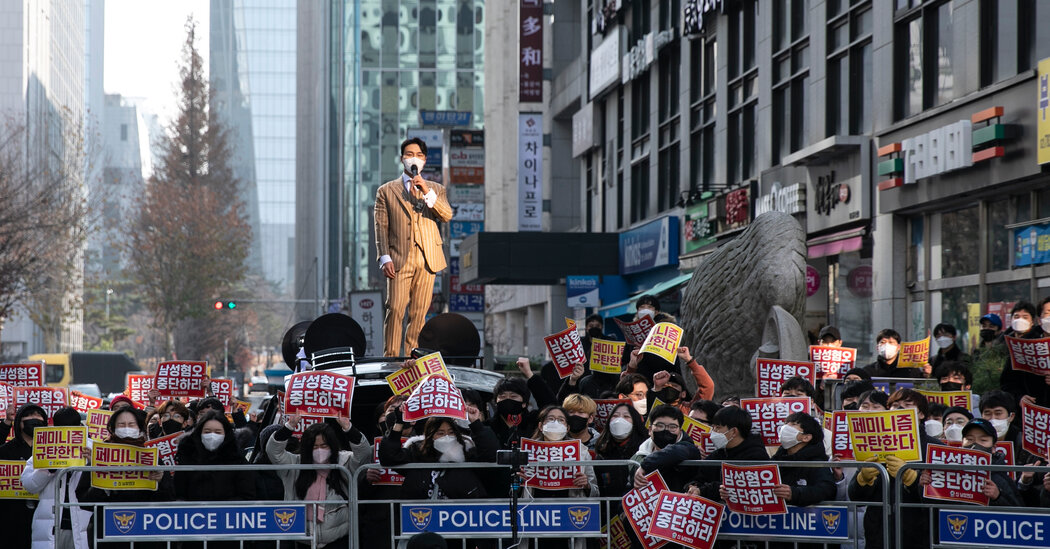
SEOUL — They have shown up whenever women rallied against sexual violence and gender biases in South Korea. Dozens of young men, mostly dressed in black, taunted the protesters, squealing and chanting, “Thud! Thud!” to imitate the noise they said the “ugly feminist pigs” made when they walked.
“Out with man haters!” they shouted. “Feminism is a mental illness!”
On the streets, such rallies would be easy to dismiss as the extreme rhetoric of a fringe group. But the anti-feminist sentiments are being amplified online, finding a vast audience that is increasingly imposing its agenda on South Korean society and politics.
These male activists have targeted anything that smacks of feminism, forcing a university to cancel a lecture by a woman they accused of spreading misandry. They have vilified prominent women, criticizing An San, a three-time gold medalist in the Tokyo Olympics, for her short haircut.
They have threatened businesses with boycotts, prompting companies to pull advertisements with the image of pinching fingers they said ridiculed the size of male genitalia. And they have taken aim at the government for promoting a feminist agenda, eliciting promises from rival presidential candidates to reform the country’s 20-year-old Ministry of Gender Equality and Family.
South Korea is reckoning with a new type of political correctness enforced by angry young men who bristle at any forces they see as undermining opportunity — and feminists, in their mind, are enemy No. 1. Inequality is one of the most delicate issues in South Korea, a nation with deepening economic uncertainty, fed by runaway housing prices, a lack of jobs and a widening income gap.
“We don’t hate women, and we don’t oppose elevating their rights,” said Bae In-kyu, 31, the head of Man on Solidarity, one of the country’s most active anti-feminist groups. “But feminists are a social evil.”
The group spearheads the street rallies and runs a YouTube channel with 450,000 subscribers. To its members, feminists equal man haters.
Its motto once read, “Till the day all feminists are exterminated!”
The backlash against feminism in South Korea may seem bewildering.
South Korea has the highest gender wage gap among the wealthy countries. Less than one-fifth of its national lawmakers are women. Women make up only 5.2 percent of the board members of publicly listed businesses, compared with 28 percent in the United States.
And yet, most young men in the country argue that it is men, not women, in South Korea who feel threatened and marginalized. Among South Korean men in their 20s, nearly 79 percent said they were victims of serious gender discrimination, according to a poll in May.
“There is a culture of misogyny in male-dominant online communities, depicting feminists as radical misandrists and spreading fear of feminists,” said Kim Ju-hee, 26, a nurse who has organized protests denouncing anti-feminists.
The wave of anti-feminism in South Korea shares many of the incendiary taglines with right-wing populist movements in the West that peddle such messages. Women who argue for abortion rights are labeled “destroyers of family.” Feminists are not champions of gender equality, but “female supremacists.”
In South Korea, “women” and “feminists” are two of the most common targets of online hate speech, according to the country’s National Human Rights Commission.
The backlash represents a split from previous generations.
Older South Korean men acknowledge benefiting from a patriarchal culture that had marginalized women. Decades ago, when South Korea lacked everything from food to cash, sons were more likely to be enrolled in higher education. In some families, women were not allowed to eat from the same table as men and newly born girls were named Mal-ja, or “Last Daughter.” Sex-preference abortions were common.
As the country has grown richer, such practices have become a distant memory. Families now dote on their daughters. More women attend college than men, and they have more opportunities in the government and elsewhere, though a significant glass ceiling persists.
“Men in their 20s are deeply unhappy, considering themselves victims of reverse discrimination, angry that they had to pay the price for gender discriminations created under the earlier generations,” said Oh Jae-ho, a researcher at the Gyeonggi Research Institute in South Korea.”
If older men saw women as needing protection, younger men considered them competitors in a cutthroat job market.
Anti-feminists often note that men are put at a disadvantage because they have to delay getting jobs to complete their mandatory military service. But many women drop out of the work force after giving birth, and much of the domestic duties fall to them.
“What more do you want? We gave you your own space in the subway, bus, parking lot,” the male rapper San E writes in his 2018 song “Feminist,” which has a cult following among young anti-feminists. “Oh girls don’t need a prince! Then pay half for the house when we marry.”
The gender wars have infused the South Korean presidential race, largely seen as a contest for young voters. With the virulent anti-feminist voice surging, no major candidate is speaking out for women’s rights, once such a popular cause that President Moon Jae-in called himself a “feminist” when he campaigned about five years ago.
Yoon Suk-yeol, the candidate of the conservative opposition People Power Party, sided with the anti-feminist movement when he accused the ministry of gender equality of treating men like “potential sex criminals.” He promised harsher penalties for wrongfully accusing men of sex crimes, despite concerns it would discourage women from speaking out.
But Mr. Yoon also recruited a prominent 31-year-old leader of a feminist group as a senior campaign adviser last month, a move intended to assuage worries that his party has alienated young female voters.
By law, Mr. Moon cannot seek re-election. His Democratic Party’s candidate, Lee Jae-myung, has also tried to appeal to young men, saying: “Just as women should never be discriminated against because of their gender, nor should men suffer discrimination because they are men.”
Mr. Lee sees the gender conflict largely as a problem of dwindling job opportunities, comparing young South Koreans to “chicks struggling not to fall off a crowded nest.” “We must make the nest bigger by recovering growth,” he has said.
It is hard to tell how many young men support the kind of extremely provocative and often theatrical activism championed by groups like Man on Solidarity. Its firebrand leader, Mr. Bae, showed up at a recent feminist rally dressed as the Joker from “Batman” comics and toting a toy water gun. He followed female protesters around, pretending to, as he put it, “kill flies.”
Tens of thousands of fans have watched his stunts livestreamed online, sending in cash donations. During one online talk-fest in August, Mr. Bae raised nine million won ($7,580) in three minutes.
Women’s rights advocates fear is that rise of anti-feminism might stymie, or even roll back, the hard-won progress South Korea has made in expanding women’s rights. In recent decades, they fought to legalize abortion and started one of the most powerful #MeToo campaigns in Asia.
Lee Hyo-lin, 29, said that “feminist” has become such a dirty word that women who wear their hair short or carry a novel by a feminist writer risk ostracism. When she was a member of a K-pop group, she said that male colleagues routinely commented on her body, jeering that she “gave up being a woman” when she gained weight.
“The #MeToo problem is part of being a woman in South Korea,” she said. “Now we want to speak out, but they want us to shut up. It’s so frustrating.”
On the other side of the culture war are young men with a litany of grievances — concerns that are endlessly regurgitated by male-dominated forums. They have fixated, in particular, on limited cases of false accusations, as a way to give credence to a broader anti-feminist agenda.
Son Sol-bin, a used-furniture seller, was 29 when his former girlfriend accused him of rape and kidnapping in 2018. Online trolls called for his castration, he said. His mother found closed-circuit TV footage proving the accusations never took place.
“The feminist influence has left the system so biased against men that the police took a woman’s testimony and a mere drop of her tears as enough evidence to land an innocent man in jail,” said Mr. Son, who spent eight months in jail before he was cleared. “I think the country has gone crazy.”
As Mr. Son fought back tears during a recent anti-feminist rally, other young men chanted: “Be strong! We are with you!”







